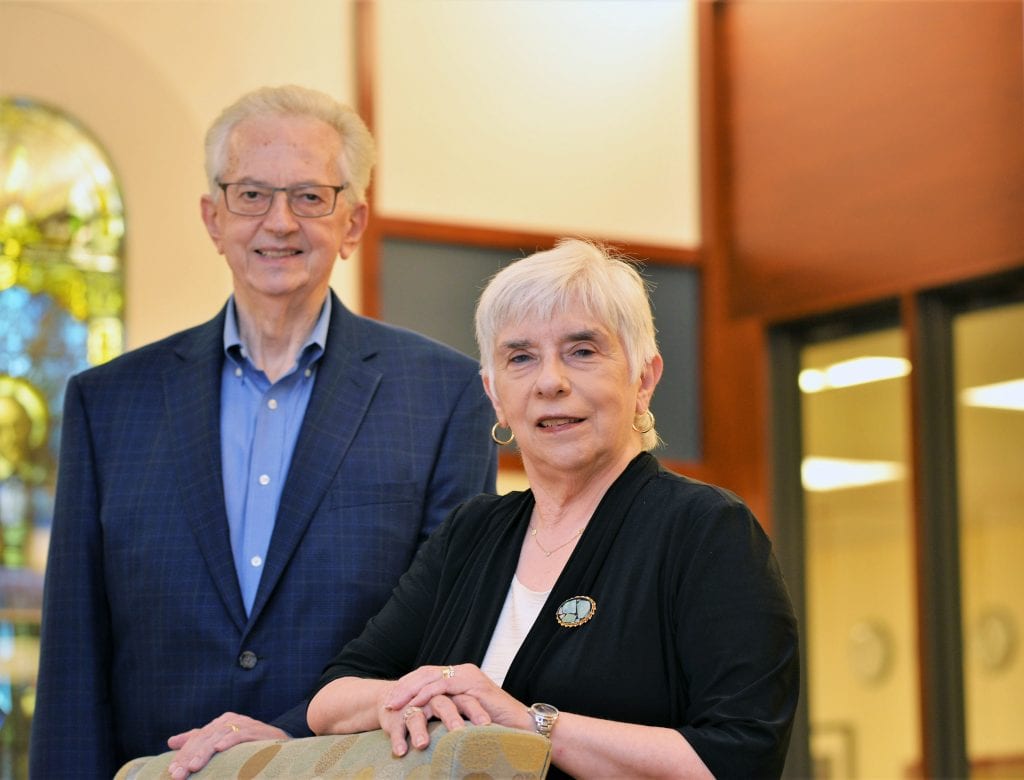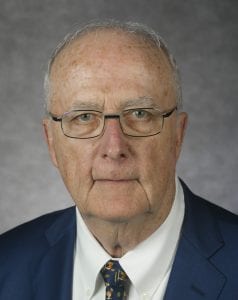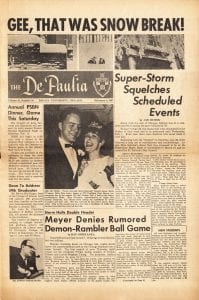
Faculty members Harold Welsch and Helen LaVan found their callings to become professors while earning their DePaul MBAs.
DePaul business professors have long been known for incorporating the real world into their teaching and scholarship. In their classroom discussions and research, they explore emerging trends and what they mean for business and society. For management professors Helen LaVan (MBA ’69) and Harold Welsch (BUS ’66, MBA ’68), the seeds of this teaching philosophy were planted when they were DePaul MBA students themselves.
LaVan was taking night classes in the MBA program and working days in the human resources department of Montgomery Ward when executives at that Chicago-based retailer tapped her to work with a team on a special project. She and her colleagues were tasked with researching solutions for the violent unrest that had erupted in Chicago and other American cities in the wake of the 1967 assassination of Martin Luther King Jr. and the 1968 Democratic Convention. “They wanted to be good corporate citizens, and they were trying to help prevent the riots from happening again,” she explains. The report advocated for better jobs and educational opportunities, among other remedies, to address the roots of violence.
“The fact that I was singled out to work on this was kind of amazing,” LaVan says. It solidified her interest in pursuing an academic career in business from the human resources perspective. One of only four women in her MBA class, LaVan became the first woman graduate assistant at the college. After she finished her DePaul MBA and earned a PhD in organizational behavior from Loyola University of Chicago, she returned to DePaul to teach human resources. This year, she celebrates her 49th year on the faculty.
It was the business school’s first computer class that led Welsch down a groundbreaking academic path. The use of computers in business “was new, innovative, something that appeared from nowhere,” he remembers. The college’s faculty “had the foresight to realize that we needed to harness this for creating some good, and that got me thinking, how do you harness innovations? If the computer is one of the new things happening, what other new things are just around the corner?”
Entrepreneurship was that next big thing, Welsch realized. He finished his MBA, joined DePaul’s management faculty and completed a PhD at Northwestern University. In 1973, he began working with small-business clients to test and apply some of the theories he taught in his classes. In the early 1980s, he founded DePaul’s entrepreneurship program, one of the first in the country. Since then, the nationally ranked program has produced hundreds of successful entrepreneurs who are harnessing innovations to address a wide range of business and societal challenges.
Earning an MBA was a rare accomplishment in the 1960s, Welsch says, and he treasures his degree. With an MBA, “you stood out as a candidate for the career fast track in your chosen endeavor for whatever organization you selected.”
By Robin Florzak
Read more about MBA grads from other decades:
- The 1950s: From GI to MBA
- The 1960s: Scholars of Change
- The 1970s: MBA-Powered Leaders
- The 1980s: Chicago-Educated, World Ready
- The 1990s: Cultivating People and Profits
- The 2000s: Leaders Who Pay It Forward
- The 2010s: The Career-Changing MBA
More memories from a 1960s DePaul MBA graduate:
 “After graduating from DePaul with a bachelor’s degree in business in February of 1965, I immediately entered the MBA program at DePaul. All classes were in the evenings. During the day I worked as a staff accountant at J.P. Varkala & Co., a small CPA firm on the South Side.
“After graduating from DePaul with a bachelor’s degree in business in February of 1965, I immediately entered the MBA program at DePaul. All classes were in the evenings. During the day I worked as a staff accountant at J.P. Varkala & Co., a small CPA firm on the South Side.
“Among the professors I remember best was Ed Cohen. He taught a graduate financial accounting class that was outstanding. His classes were interesting and very challenging. Between taking him as an undergraduate, the CPA Review and graduate accounting classes, I had Ed for five accounting classes. It provided an excellent background. Later, when I earned a doctorate in accounting from University of Kentucky, I was ahead of my classmates in accounting knowledge and understanding, all because of Ed.
“(I also remember) Helene Ramanauskas-Marconi. Helene taught the capstone accounting class…She required us to present the results of our research in front of class, which was unusual for the time.
“The two years in the MBA program went fast because I was working in public accounting at the same time. My last class was with Marketing Professor Jack Goldstucker. Getting to the final exam for this course was a chore because it was the night of the Blizzard of ‘67 and Chicago was shut down. I had to hitch hike to the final exam. Only about a third of the class was able to get to the exam.”
— John Ahern (BUS ’65, MBA ’67)
Associate Professor of Accountancy & MIS
Director, Richard H. Driehaus Center for International Business
DePaul University
